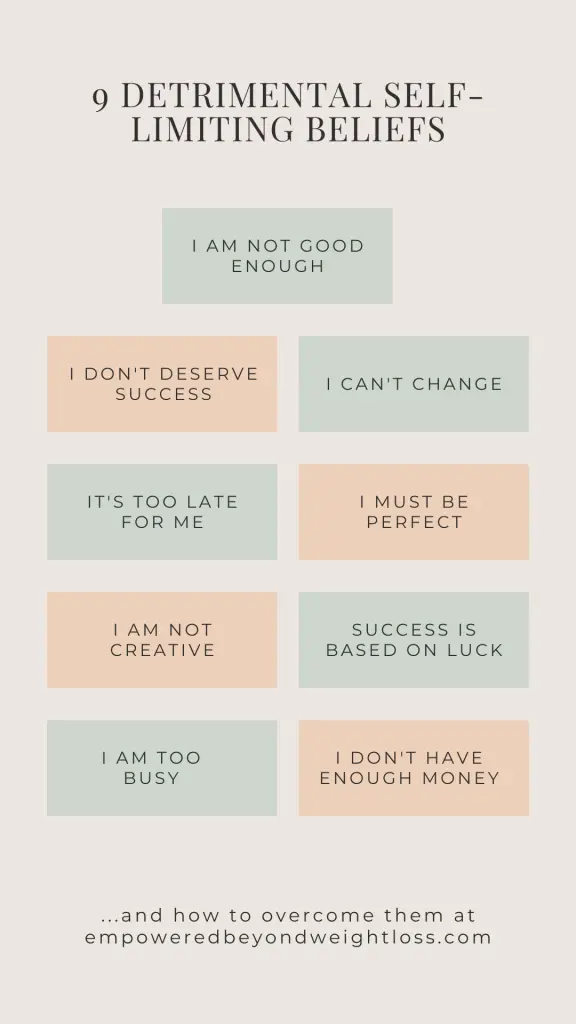Whether you want to lose weight, get in shape, or start a business, you may have to overcome some common self-limiting beliefs to achieve your dream. Let me show you how.
What Are Self-Limiting Beliefs
Self-limiting beliefs are a branch of mindset. They are negative or limiting beliefs about ourselves, our abilities, and our potential. With a negative mindset, your beliefs become self-limiting, and you forget you can do anything positive. More often than not, those beliefs come from things you have been told in your lifetime, whether as a child or adult. Some words make you become a certain way and believe certain things about yourself. When you hear positive words and affirmations, you become those, and the same happens with negative words and derogatory remarks.
How Do You Identify Self-Limiting Beliefs?
Our self-limiting beliefs can hold us back from achieving our goals and living the life we want. Here are some ways to identify self-limiting beliefs:
- Pay attention to negative self-talk: Negative self-talk is an inner dialogue we have with ourselves, which can be a good indicator of our self-limiting beliefs. Listen to what you say to yourself when feeling down or frustrated. Do you tell yourself that you’re not good enough, that you’ll never be successful, or that you’re not smart enough?
- Look for patterns: Look for patterns in your thoughts and behavior. Do you consistently avoid certain situations or opportunities because you believe you’re not good enough or fear failure? Do you find yourself holding back or not fully committing to your goals and aspirations?
- Reflect on past experiences: Reflect on past experiences where you may have held back or not pursued something because of a belief you had about yourself. Ask yourself if that belief was helpful or if it held you back from achieving what you wanted.
- Pay attention to emotions: Self-limiting beliefs can create negative emotions such as fear, anxiety, and self-doubt. Pay attention to how you feel when you’re faced with a challenge or opportunity. If you feel anxious or fearful, it could be a sign that you have a self-limiting belief that is holding you back.
- Challenge your beliefs: Once you’ve identified a self-limiting belief, challenge it. Ask yourself if it’s really true or if it’s just a story you’ve been telling yourself. Look for evidence that contradicts the belief, and focus on positive affirmations that support a more positive and empowering belief.
Remember, self-limiting beliefs are not set in stone. With awareness and effort, you can overcome them and achieve your goals.

How Do Self-Limiting Beliefs Work?
Self-limiting beliefs are beliefs we hold about ourselves, others, or the world around us that limit our potential or hold us back from achieving our goals. These beliefs are often formed in response to past experiences or conditioning, and they can become so deeply ingrained that we don’t even question them.
Self-limiting beliefs create a mental framework or filter through which we interpret the world around us. We may feel anxious, defensive, or insecure when we encounter situations that challenge these beliefs. This can lead to behaviors reinforcing the belief, such as avoiding certain situations or people, procrastinating, or settling for less than we deserve.
For example, if someone has a self-limiting belief that they are not good enough, they may avoid applying for jobs or promotions that require them to step outside their comfort zone. This can result in missed opportunities for growth and advancement.
Self-limiting beliefs can also become self-fulfilling prophecies. When we believe we are incapable or deserving of success, we may unconsciously sabotage our efforts or give up too easily. This can create a cycle of failure and reinforce the belief that we are not good enough.
Overcoming self-limiting beliefs requires awareness, self-reflection, and a willingness to challenge our assumptions. By questioning the validity of these beliefs and reframing them in a more positive light, we can begin to shift our mindset and unlock our true potential.
You may enjoy this article about false or self-limiting beliefs.
What Are Self-Limiting Behaviors?
With self-limiting beliefs, you create habits that are not focused on growth. Instead, the habits you create continue leading you down a path of negativity and shrinking. And that is not who you are. You get to decide which way you go.
Self-limiting behaviors are patterns of behavior that hold individuals back from reaching their full potential or achieving their goals. These behaviors are often driven by fear, self-doubt, or a lack of confidence. They can become ingrained habits that prevent individuals from taking risks, pursuing new opportunities, or achieving their desired outcomes.
Examples of self-limiting behaviors include:
- Procrastination: Delaying tasks until the last minute or putting them off indefinitely due to fear of failure or perfectionism.
- Negative self-talk: Consistently engaging in self-critical or self-deprecating thoughts can damage self-esteem and confidence.
- Playing it safe: Avoiding risks and new experiences out of fear of failure or uncertainty.
- Lack of assertiveness: Failing to speak up or advocate for oneself in situations that require it due to fear of confrontation or rejection.
- Avoidance: Avoiding situations or people that cause discomfort or anxiety rather than facing and addressing the underlying issues.
By recognizing and addressing self-limiting behaviors, individuals can take steps to break these patterns and overcome the obstacles that stand in the way of their personal and professional growth.

Common Self-Limiting Beliefs
This section gives you some examples of common self-limiting beliefs. This list of self-limiting beliefs will enable you to discern what thoughts are creating counterproductive behaviors. In the next section, I will also give tips for overcoming your self-limiting beliefs.
1. I am Not Good Enough
This belief is one of the most pervasive and damaging self-limiting beliefs. It can prevent individuals from pursuing their dreams or taking risks because they fear they cannot succeed. They feel inadequate, whether it’s a lack of knowledge, experience, patience, or confidence. Oftentimes, the self-limiting belief “I am not good enough” isn’t a conscious one. However, it is at the root of many other more conscious thoughts like:
- “I’m never going to be able to do this. I’m not smart/talented/experienced enough.”
- “Why even bother trying? I’m just going to fail anyway.”
- “I have to be perfect, or else people will see that I’m not good enough.”
- “Everyone else is so much better than me. I’ll never measure up.”
- “I’m such a failure. I can’t do anything right.”
The more you try, the more you will grow and learn.
2. I Don’t Deserve Success
This self-limiting belief can lead to self-sabotage or undermine efforts to achieve goals because individuals believe they are not worthy of the rewards that come with success.
Here are some examples of beliefs that may contribute to the feeling of not deserving success:
- “I’m not smart/talented/good enough to succeed.”
- “I’m not as good as other people who have succeeded.”
- “I haven’t worked hard enough to deserve success.”
- “Success is based on luck, and I’m not lucky.”
- “I’ve made too many mistakes in the past to deserve success now.”
- “I don’t come from a privileged background, so success is not meant for me.”
- “Success always comes at a price, and I don’t want to sacrifice other aspects of my life to achieve it.”
- “Success will change me in ways that I don’t want to be changed.”
- “I’m afraid of success because it will bring more attention, criticism, or pressure.”
- “I’m not comfortable with the idea of being better than others or standing out from the crowd.”
These beliefs can be rooted in fear, self-doubt, comparison with others, past experiences, and cultural or social conditioning. It’s important to identify and challenge them in order to increase one’s self-worth and confidence.

3. I Can’t Change
This belief can prevent individuals from making positive changes in their lives or pursuing personal growth because they feel stuck in their current circumstances. It stems from a fixed mindset. Read Growth Mindset Vs. Fixed Mindset: Change Your Life With a New Mindset to learn how to improve your mindset and overcome the idea that you can’t change.
4. It’s Too Late For Me
Maybe you feel you have missed opportunities and are getting too old to achieve your goals. It`s never too late! I learned yoga and became a yoga instructor after 40. Got in the best shape of my life after 40 and I have plenty more things to accomplish as I get older! Read Starting Yoga at 40 or Later: Everything You Need to Know or 1-Year Yoga Transformation: Before and After Pictures if you want to start getting inspired. If you are not into yoga at this time, you may like My Intermittent Fasting Weight Loss Journey After 40.

5. I Must Be Perfect
This self-limiting belief can lead to a fear of making mistakes or taking risks, as individuals feel they must meet impossibly high standards to succeed. It is often a reason why people procrastinate. They feel paralyzed because it`s overwhelming to have to do something perfectly.
Always remember: you have to suck at something to get better at it! That`s just the way it is! I can tell you from experience when I started blogging, my blog posts sucked. When I started creating videos, my videos sucked (they still stuck sometimes!). And you know what? That’s OK! Show up for yourself. Show up for others. The more you do, the easier it will get.
As you do, you will learn to embrace imperfection and accept that imperfection is part of life and that it’s okay to make mistakes. There is value in imperfection. Practice placing your focus on progress rather than perfection.
Need more help improving your mindset? I created a free resource called Master Your Mindset in 7 Days.

6. I Am Not Creative
Another one of the self-limiting beliefs created by a fixed mindset. It can prevent individuals from exploring new ideas or pursuing creative endeavors because they believe they lack the innate talent or ability to be creative.
It’s common to feel like you’re not creative, but it’s important to remember that creativity is a skill that can be developed and improved over time. Here are some tips to help you overcome the thought that you’re not creative:
- Reframe your thinking: Instead of telling yourself, “I’m not creative,” try saying, “I’m working on developing my creativity.”
- Experiment: Try new things and explore different creative outlets. Don’t be afraid to fail; this is an important part of the creative process.
- Learn from others: Look to others for inspiration and learn from their techniques and processes. Attend workshops, read books, and watch tutorials to expand your knowledge and skill set.
- Practice regularly: Make creativity a habit by practicing it regularly, even if it’s just for a few minutes a day. This will help you build your creative muscles and develop your own unique style.
- Embrace your uniqueness: Remember that everyone has their unique perspective and way of doing things. Don’t compare yourself to others; instead, focus on embracing your unique approach to creativity.
- Take breaks: Sometimes, taking a break and giving yourself space can help you develop new and creative ideas. Give yourself time to recharge and return to your creative projects with a fresh perspective.
Remember that creativity is not just limited to the arts. It can be applied in various aspects of life, such as problem-solving, communication, and decision-making. Incorporating creativity into your daily routine can improve your overall quality of life and achieve your goals.

7. Success Is Based on Luck
This self-limiting belief can lead individuals to discount their skills or achievements, believing their success is solely due to external factors rather than their hard work and ability. Overnight successes are rare! Behind successful people is a long history of hard work and failures! So, no! Success is not based on luck! If you succeeded at something, take credit for it! If you haven’t succeeded yet, no that, persistence is key.
8. I Am Too Busy
This is one of the most common self-limiting beliefs, hands down! I should probably have made it number one or two! Many people who want to achieve a goal give up because they tell themselves they are too busy to keep trying.
Feeling too busy can be a common barrier to making time for your goals, but there are ways to overcome this thought and make progress toward your aspirations. Here are some strategies that can help:
- Prioritize your goals: If you feel too busy to pursue your goals, it may be helpful to prioritize them based on their importance and urgency. Identify the most important goals for you and focus on those first.
- Set realistic expectations: It’s essential to set realistic expectations for what you can accomplish, given your current commitments and schedule. Don’t expect yourself to accomplish everything at once, but instead set smaller, achievable goals that you can work towards gradually.
- Identify time wasters: Take a look at how you’re spending your time and identify any activities or tasks that may be taking up too much of your time without adding much value. Consider cutting back on these time wasters to make more time for your goals.
- Schedule your time: Make a schedule that includes time for your goals and stick to it as much as possible. This can help you stay organized and focused and ensure that you’re making progress toward your goals.
- Practice self-care: Taking care of yourself can help you be more productive and make more time for your goals. Ensure you get enough rest, eat well, and take breaks when needed.
- Delegate or outsource tasks: If possible, delegate or outsource tasks that are taking up too much of your time or that can be done by someone else. This can free up more time for you to work on your goals.
Remember that making time for your goals requires effort and planning, but it is possible. With these strategies, you can overcome the thought that you are too busy and start making progress toward your aspirations.

9. I Don’t Have Enough Money
The self-limiting belief I don’t have enough money is similar to the I am too busy belief. You make time and money for what you genuinely want and care about. It’s that simple! In the same way you prioritize your goals to make time for them, you can prioritize your budget items.
Also, something I tend to remind myself when it comes to investing money in my goals is that my time is worth money. I am willing to pay to save time!
How to Overcome Your Self-Limiting Beliefs
Overcoming self-limiting beliefs can be challenging, but it is possible with effort and dedication. Here are some tips that may help:
- Identify the source of the belief: Try to pinpoint where the belief came from. Is it something that you were told by someone else? Is it a result of your past experiences? Understanding the root cause can help you to challenge the belief. Journal your thought process if that’s helpful.
- Challenge the belief: Once you have identified it, start questioning it. Ask yourself if it is accurate or if there is evidence to support it. Often, self-limiting beliefs are based on assumptions rather than facts. Assess the accuracy of your beliefs. Are they based on your history?
- Practice self-compassion without self-indulgence: Be kind and understanding towards yourself. Recognize that everyone has flaws and imperfections and that it is okay to make mistakes, but take specific actions to improve your shortcomings.
- Focus on your strengths: Make a list of your strengths and accomplishments, and remind yourself of them regularly. Celebrate your successes, no matter how small they may seem.
- Surround yourself with positivity: Spend time with people who uplift and support you. Avoid negative influences that reinforce your self-limiting beliefs. Use positive affirmations and practice gratitude.
- Set realistic goals: Break down larger goals into smaller, more manageable ones. This will help you build confidence and achieve success, which can help counteract self-limiting beliefs.
- Seek professional help: If your self-limiting beliefs are significantly impacting your life, consider seeking the help of a therapist or counselor. They can help you to work through your beliefs and develop strategies to overcome them.
Remember that overcoming self-limiting beliefs is a process; it may take time and effort to see results. But with patience and perseverance, it is possible to change how you think about yourself and reach your full potential.
Something else to remember is that your thoughts and beliefs create your feelings. Did you know that your feelings and emotions impact your health? Dealing with what’s happening inside your brain is essential to your overall well-being. Read The Mind/Body Connection: How Your Emotions Affect Your Health to learn more.
In Summary
Letting go of your self-limiting beliefs will require inner work, but you can! The first step is understanding what your mind is doing and challenging your beliefs with facts. That’s precisely why I wrote this article. I hope you have enough to get started and rise above the detrimental thoughts that keep you stuck!





